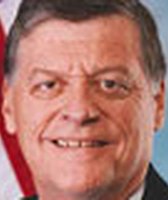Stand up for the facts!
Our only agenda is to publish the truth so you can be an informed participant in democracy.
We need your help.
I would like to contribute

PolitiFact Australia has a very different look than our U.S. sites, but the journalism is the same: holding politicians accountable for their words.
When an Australian politician recently made a claim about U.S. climate-change politics, fact-checkers on both continents jumped in.
Greg Hunt said, "there is virtually no prospect that the U.S. will adopt a cap and trade system at any point in the period to 2020."
Predicting the political future involves inherent risk — but did he have a point?
In his speech, Hunt backed up the statement by saying senior Republicans, such as Jim Sensenbrenner, had declared that: "Any kind of carbon tax is dead in the U.S.," and that President Barack Obama used his 2013 State of the Union address to acknowledge that the most likely course of action would be energy efficiency programs.
In a PolitiFact first, our partners at PolitiFact Australia asked us to help assess whether there was "virtually no prospect" of Washington adopting a cap and trade system by 2020. Our research showed a lot could change in a few years — indeed it already has.
In 2008, presidential candidates for both political parties, Sen. John McCain and Sen. Barack Obama, supported federal cap and trade policies.
In 2009, climate change legislation championed by a coalition of business and environmental leaders barely passed a Democrat-led House then fell apart in a Democrat-led Senate. Even McCain, long a reliable supporter for climate policy, abandoned the effort.
Fierce grass roots efforts by conservative protesters took the bill’s supporters by surprise. They had expected some Republican support for a market-based effort at carbon reduction.
Instead, in the end, Republican senators refused to support any type of cap and trade legislation, with backing from grass roots and big-money conservatives. In the 2010 midterm elections, Congress, Republicans took the House.
"The 112th House that took office in January 2011 was one of the most right-wing in U.S. history, and it included dozens of tea party backed Republicans who would not bargain about any major Democratic legislative priority, certainly not carbon controls or green energy legislation," wrote Theda Skocpol, a political scientist at Harvard University who examined the bill’s failure and has written a book about tea party conservatives.
We did find smaller-scale actions on climate plans: There are already some regional and state-based cap and trade efforts in the United States for carbon emissions, such as in California and the north-eastern states.
Meanwhile, Obama outlined his own climate action plan that directs the U.S. Environmental Protection Agency to set federal limits on carbon pollution.
But setting up a federal cap and trade program – one that set a mandatory cap on carbon pollution but gave polluters the ability to trade allowances – will require cooperation from Congress.
No one PolitiFact spoke with believes the current Congress would take up such an effort, which would require a bipartisan effort with majorities in the Republican-led House and Democrat-led Senate agreeing to a bill that Obama would sign.
"Nothing's going to happen with any sort of carbon-capping until Democrats control both houses of Congress. That's for sure," Skocpol told PolitiFact.
And even then, it would require sustained, broad networks of support for congressional action, according to Skocpol’s post-mortem on the 2009 effort.
Lawmakers from states with strong oil or coal production or that rely on coal for electricity would be unlikely to support caps on carbon whatever their party.
The question is: What would it take to resurrect federal cap and trade efforts by 2020?
Expert views on whether there’s a "prospect" that the United States would adopt a cap and trade system or carbon tax by 2020 depends on their support or opposition to the effort. Supporters see a chance, perhaps under the next president and after the 2018 midterm elections. Opponents say it’s virtually nil, just as Hunt does.
House Republicans are strongly favored to stay in power in 2014. Meanwhile, Republicans would need to gain just six seats to take control of the Senate.
But for a switch later, the story goes something like this: A strong Democratic presidential candidate in 2016 commands a large turnout, which helps gain the House. That hold strengthens in the 2018 mid term elections.
That might be light-years away in terms of American politics, but so is Hunt’s claim about cap and trade policy prior to 2020.
"What happens in ‘14 or ‘16 or ‘18 is in the American crystal ball," said David Doniger, a policy director for the Natural Resources Defense Council.
A lot could change in the next seven years. A lot has in the last seven. But the odds are stacked up against rapid change given the makeup of the White House and the Congress.
Hunt’s assessment holds more or less true until at least 2018, and the qualified phrase "virtually no prospect" gives him extra cover.
PolitiFact Australia rated his statement Mostly True.
Our Sources
PolitiFact Australia, "Greg Hunt says US won't adopt cap and trade by 2020," July 30, 2013
Library of Congress' Thomas, "American Clean Energy and Security Act of 2009," accessed July 22, 2013 (Roll call vote in House)
Pew Research Center, "Energy and Environment," accessed July 22, 2013
U.S. Environmental Protection Agency, "Cap and Trade," accessed July 22, 2013
U.S. Environmental Protection Agency, "Cap and Trade: Frequent Questions," accessed July 22, 2013
White House, "Inaugural Address by President Barack Obama," Jan. 21, 2013
White House, "The 2013 State of the Union," Feb. 12, 2013
White House, "Remarks by the President on Climate Change," June 25, 2013
White House, "FACT SHEET: President Obama’s Climate Action Plan," June 25, 2013
Theda Skocpol, "NAMING THE PROBLEM: What It Will Take to Counter Extremism and Engage Americans in the Fight against Global Warming," January 2013
Washington Post's Wonkblog, "Why has climate legislation failed? An interview with Theda Skocpol," Jan. 16, 2013
New York Times, "‘Cap and Trade’ Loses Its Standing as Energy Policy of Choice," March 25, 2010
Interview with Theda Skocpol, professor of government and sociology, Harvard University, July 22, 2013
Interview with David Doniger, policy director, Climate & Clean Air Program, Natural Resources Defense Council, July 22, 2013
Interview with Andrew Light, senior fellow, Center for American Progress, July 19, 2013
Interview with Nat Keohane, vice president, international climate, Environmental Defense Fund, July 19, 2013
Interview with Myron Ebell, director, Center for Energy and Environment, Competitive Enterprise Institute, July 19, 2013
Email interview with Sallie James, policy analyst, Cato Institute, July 19, 2013
















































